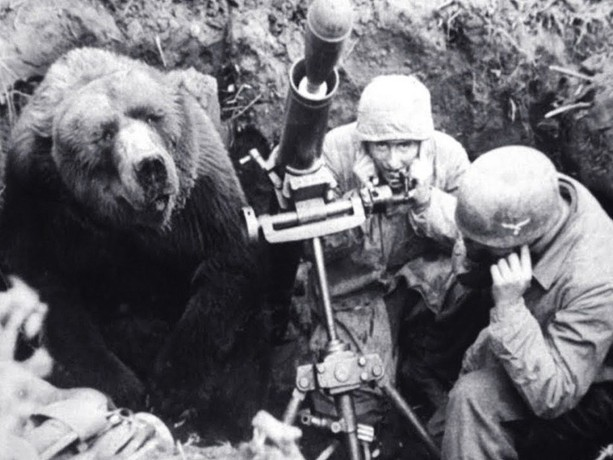Wojtek the Bear: The Soldier Who Marched on Four Legs
During the chaos and camaraderie of World War II, a most unusual soldier joined the ranks of the Polish army — a Syrian brown bear named Wojtek. Adopted by the 22nd Artillery Supply Company of the II Corps in 1942, Wojtek didn’t just boost morale; he became a symbol of resilience, loyalty, and wartime humor, eventually earning the official rank of corporal.
From Cub to Comrade
Wojtek’s journey began in the hills near Hamadan, Iran, where a young shepherd traded a bear cub — orphaned by hunters — to Polish soldiers for a Swiss Army knife, canned beef, and some chocolate. The soldiers took in the cub, feeding him condensed milk from a vodka bottle and pampering him with fruit, marmalade, and honey. They named him Wojtek, short for Wojciech, meaning “joyful warrior” in Polish — a name he would come to embody.
Private Peter Prendys became Wojtek’s caretaker, teaching the bear to march, salute, and even wave. Wojtek soon became a beloved figure in the unit, often wrestling and playing with the troops. He had a fondness for beer, cigarettes (which he reportedly ate), and even learned to take long cold showers — eventually turning them on himself, much to the annoyance of his water-conscious comrades.
A Bear in Battle
In 1944, when the Polish troops were preparing to join the Allied campaign in Italy, military regulations forbade pets. To keep him with the unit, Wojtek was officially enlisted, given the rank of private and assigned a serial number. Now a full-fledged soldier, he accompanied the unit to the Battle of Monte Cassino.
There, legend has it that Wojtek mimicked the actions of the soldiers by carrying heavy artillery shells and ammo crates across the battlefield. This impressive feat earned him widespread admiration, and the 22nd Company even changed its insignia to a bear holding an artillery shell in his honor. Wojtek was later promoted to corporal — a rare distinction for any animal in military history.
A Hero’s Retirement
After the war, Wojtek and his fellow soldiers were relocated to a camp in Scotland. Still the center of attention, Wojtek was given daily beer rations, treats, and a swimming pool to enjoy. He continued to “serve” by helping on a nearby farm, carrying fence posts and offering his company.
With demobilization, the question of Wojtek’s future loomed. The soldiers feared for his survival in the wild and distrusted the intentions of the new communist regime in Poland. Instead, Wojtek was moved to the Edinburgh Zoo in 1947, where he lived until his death in 1963. He remained a magnet for visitors — especially his former comrades, who brought him beer, sweets, and fond memories.
Legacy of a Joyful Warrior
Wojtek’s story continues to inspire. He has been featured in documentaries such as Wojtek: The Bear That Went to War (2011) and the animated short A Bear Named Wojtek (2022). Statues of him now stand proudly in Edinburgh, Kraków, and Duns — eternal reminders of a bear who became a brother-in-arms.
In a war marked by destruction, Wojtek offered a rare symbol of warmth and unity — a gentle giant who fought not just with strength, but with spirit.


0 Comments